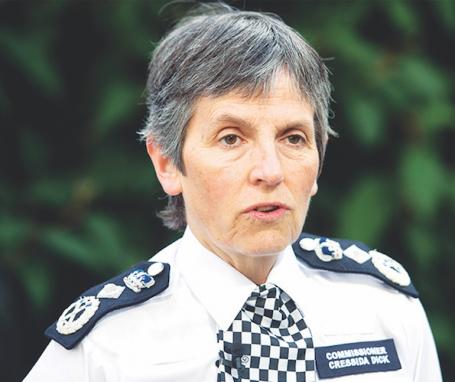MET POLICE Commissioner Cressida Dick has called on the help of the general public to curb youth violence in London.
In an exclusive interview with The Voice, Ms Dick, 57, noted the importance of the public’s role to assist the Met in it’s ongoing ght to cleanse London streets from knife and gun crime.
“The Met that I lead is here for all Londoners and we want to protect and support all Londoners and we need your help in doing that,” she said.
“We need your information, we need you on occasion to perhaps come forward and be a witness, we need you to look out for the people carrying knives and guns and challenge them if you can or ask another person in authority about it.
“I’ve got officers working incredibly long hours trying to tackle knife and gun crime. We’re arresting more people, we’re taking more weapons off the streets, we’re charging more people – we can’t do this by ourselves and we need the public to stand up and say enough is enough, this can’t go on and to get involved.”
The Met Police chief suggested there’s various ways for communities to get involved be- yond the police.
She said: “There’s a 101 ways you can contribute to stopping young people become heavy criminals by getting involved with running youth centres, mentor a young person and more.”
“We’ve been focusing on community knife sweeps, getting more of cers on the streets and targeting the people who are the most proli c users and carriers of knives,” she said.
“We’ve had a dreadful spike in the early part of this year and we’ve had several teengers and young people die which is tragic and senseless. I suppose one positive thing that comes from that horror is more people are talking about this issue and getting engaged, from the central government, Home Secretary, Prime Minister, the Mayor, schools, youth work and of course the wider public.
“We’re getting lots of people giving us information about someone who may be carrying a knife or gun and more and more parents are challenging young people who thinks carrying a knife is going to keep them safe.”

The deployment of more officers to London streets and increased community knife sweeps are just two of the tactics enforced by Ms Dick, alongside an increase in the controversial stop and search tactic, which she deems an “important tactic” and they’ll be “using it more.”
“I know that it’s a tactic or a power that the police has that’s caused a lot of concern over the years,” she admitted.
UNDERPROTECTED
“I started policing in 1983 and I know for many people who’ve lived in London for a long time, they remember what they saw as some very bad old days which were overpoliced and underprotected in some communities.
“But we have come a very long way since then and we train of cers again and again on how to manage that conversation and interaction with a young person. We hope that young people have an increasingly better understanding of their rights and what they should expect from the officer. I think there’s more for us to do there but we can do that collectively with the schools and parents.”
She added that the incorporation of body-worn cameras has had a positive impact in interaction between young people and police officers. “We get very few complaints actually – we find the body-worn cameras calm situations more than anything else.
“Stop and search is an important power to be used by the police in my view but only within the law and in a courteous manner wherever possible. I meet a lot of brave families where someone has suffered an injury and they all ask me to do more stop and searches and we want to get weapons of the streets.
“I think it’s important that the public know we are doing it, and equally important that the public know we are doing it proportionately and sensibly.”
While stop and search may be considered an effective method for some, the relationship between underprivileged BAME communities and the police continue to be strained, in part due to the controversial method.
Ms Dick notes that improving this relationship is key on her agenda, and encourages officers to step further into communities and allow young people to see them as humans first. “I think it’s really important to build that trust and so under the Mayor of London’s overall strategy and his funding, we’re investing more in our school of cers and they are going to be increasingly present in the younger schools.
“We’re also encouraging our dedicated ward officers to get involved in youth clubs and activities that take place locally where young people might be at. We’re also trying to do a lot with the third sector (voluntary organisations and charities) as intermediaries between us and some of the young people who’ve got into lots of trouble already.
“Frankly, here I am, a 57-year-old white woman who lives in central London. I’m probably not going to have a lot of impact if I try and advise a 16 year old how to make a change in their life.
“But if you’ve got someone who feels more like them and has been through some of the experiences they have, these are the people who can help them see ways in which they can protect themselves without using weapons. But we’re not going to get there overnight.”


Comments Form